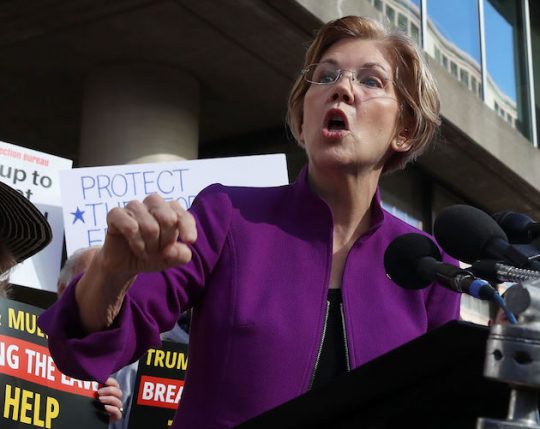Sixteen hundred bureaucrats with the power to charge billions in fines, with a $600 million budget outside of the congressional appropriations process, and all because Elizabeth Warren compared mortgages to toasters.
"Of all the ideas that get published in … journals like that, not so many make it into law," Warren boasted in 2011, at the launch of the Consumer Financial Protection Bureau.
She was referring to her essay "Unsafe At Any Rate," published by the "lefty" Democracy Journal in 2007, which was used as the impetus for the Obama administration to establish the CFPB. Warren's reasoning: If people are too stupid that they would buy a toaster that could blow up their house, then they certainly aren't smart enough to read the fine print on a mortgage.
Using a toaster as an analogy wasn't just a cute way for the then-Harvard law professor to begin her 5,000-word "manifesto" proposing her "new regulatory regime." No, the toaster was the thesis.
"It is impossible to buy a toaster that has a one-in-five chance of bursting into flames and burning down your house," Warren began. "But it is possible to refinance an existing home with a mortgage that has the same one-in-five chance of putting the family out on the street—and the mortgage won't even carry a disclosure of that fact to the homeowner."
Using a nonexistent one-in-five chance to make your claim that toasters are just like mortgages. She's off to a good start.
"It's impossible to change the price on a toaster once it has been purchased." Toasters are awesome! But, at the same time, there are adjustable-rate mortgages. Unfair!
Warren is looking out for the little guy, who, according to her, would be fooled into buying "exploding toasters" if left to his own devices. (She never takes into account that exploding toasters might be bad for business, with or without government telling companies otherwise.)
"Consumers can enter the market to buy physical products confident that they won't be tricked into buying exploding toasters and other unreasonably dangerous products," she says.
But people can be pushed into buying houses they can't afford. I wonder who gave them that idea?
Warren claims Republicans have been "scaremongering" against federal regulation since Reagan. Yet she's the one who says every house will burn down, and you'd have your "fingers and toes cut off" if it weren't for the government protecting you from yourself.
"No one advocates that people who don't want their homes burned down should stay away from toasters or that those who don't want their fingers and toes cut off should give up mowing the lawn," Warren says. "Instead, product safety standards set the floor for all consumer products, and an active, competitive market revolves around the features consumers can see, such as price or convenience or, in some cases, even greater safety."
Warren wasn't finished with the toaster. She says at least an exploding toaster is fair in that it doesn't discriminate against which person’s house it decides to burn down.
"But credit products are not nearly so egalitarian," she cautions. It's unfair, you see, that wealthy people earned enough money to not have to rack up credit card debt.
"Wealthy families can ignore the tricks and traps associated with credit card debt, secure in the knowledge that they won't need to turn to credit to get through a rough patch," Warren says, before bemoaning that the well off probably have put money aside for unexpected medical expenses or car repairs.
Warren's answer, as always in her "you didn't build that" originator style, is more government.
She proposed a "Financial Product Safety Commission." What the Consumer Product Safety Commission does for toasters, she would do for mortgages, auto loans, credit card contracts, and more.
"Clearly, it is time for a new model of financial regulation, one focused primarily on consumer safety rather than corporate profitability," she says. Clearly. "Financial products should be subject to the same routine safety screening that now governs the sale of every toaster, washing machine, and child's car seat sold on the American market."
While the CPSC has run amok from its original purpose (it now regulates drawstrings), at least it is still funded by Congress. But Warren envisioned a far more powerful agency than that—a "new regulatory regime" with little to no congressional oversight, and the ability to set its own budget funded by the Federal Reserve.
Warren was happy that the CFPB would be "free of legislative micromanaging" so federal bureaucrats could "develop nuanced regulatory responses."
She wanted a powerful agency completely protected from the people. And it makes sense: If she thinks you're too stupid to buy a toaster, how could Warren trust the American people's judgment when it comes to electing the president of the United States, who then could change who leads the CFPB?
That's why Warren and her pupils are now arguing that the president has no say in who leads her unaccountable, and unconstitutional, agency.
Because she knows better. "No one expects every customer to become an engineer to buy a toaster that doesn't burst into flames, or analyze complex diagrams to buy an infant car seat that doesn't collapse on impact," Warren explains. "By the same reasoning, no customer should be forced to read the fine print in 30-plus-page credit card contracts to determine whether the company claims it can seize property paid for with the credit card or raise the interest rate by more than 20 points if the customer gets into a dispute with the water company."
Thirty pages of fine print for what heats your bread? It's almost as if mortgages and toasters aren't that alike. But we've gotten more than enough fine print from Warren's CFPB.
